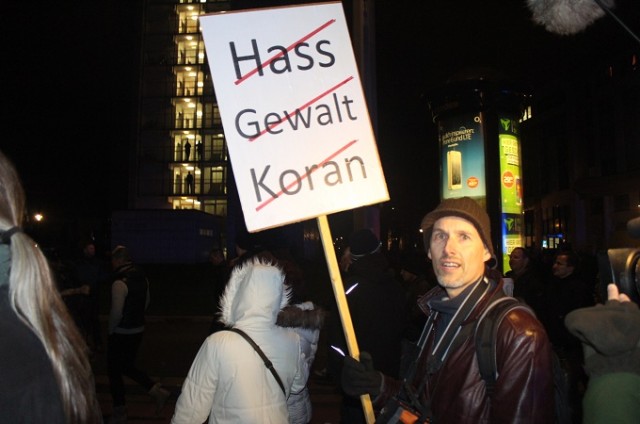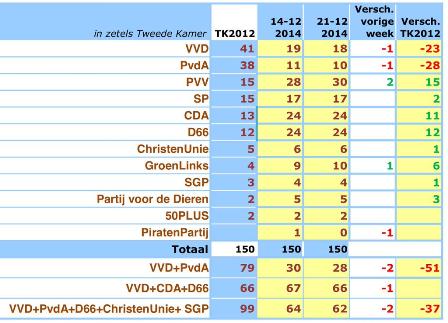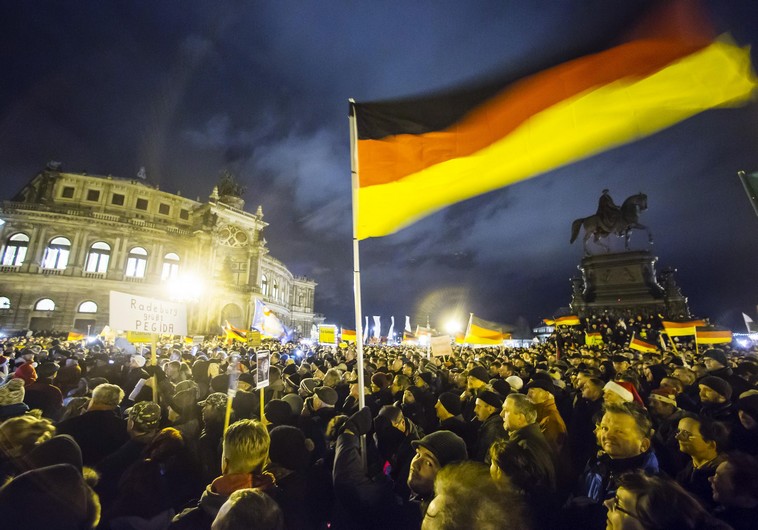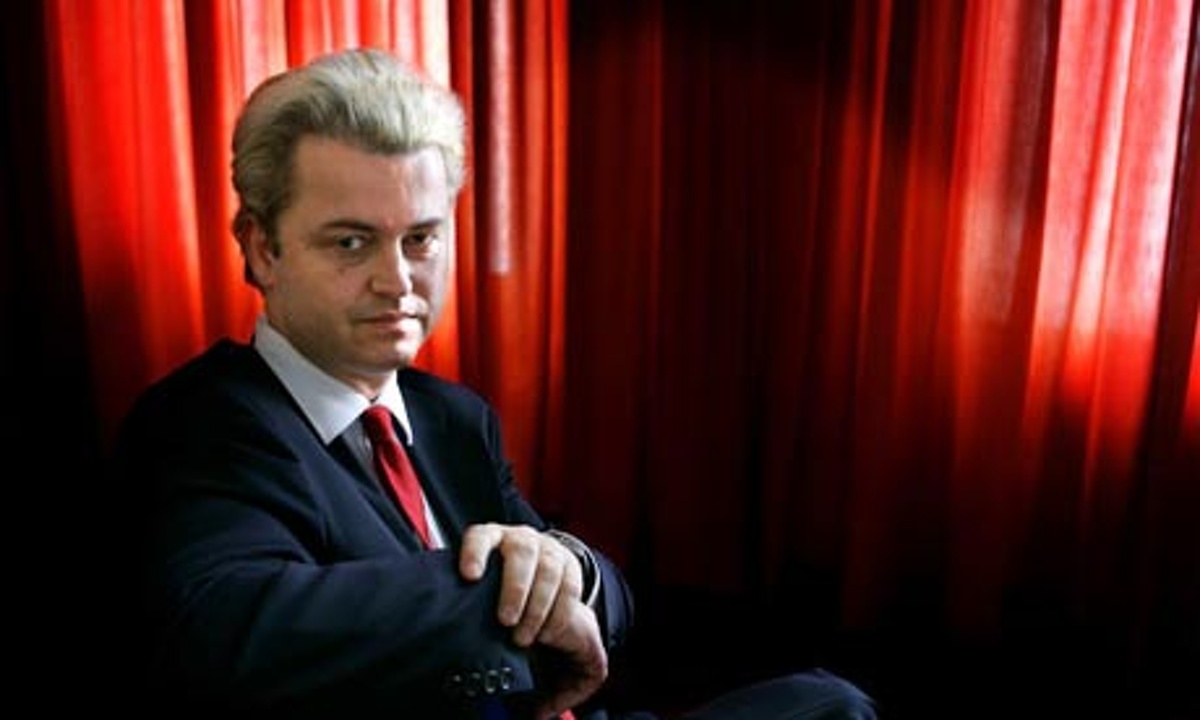Geert Wilders’ Defiant in Hague Court contesting ‘Hate Speech’ charges
Geert Wilders’ biased political show trial culminated today with his final statement to the panel of judges requesting that he be acquitted of all charges. Wilders’ and his Freedom Party (PVV) has a commanding lead in the latest political polls in the Netherlands ahead of the March 2017 general election. The daunting problem he faces if the PVV won the plurality of popular votes would be his ability to form a ruling coalition if asked to do so by King Willem -Alexander. Monday’s Wall Street Journal Europe File noted the rise of possible Euro-skeptic allies of Wilders who might form minority parties furthering the anti-immigration and anti-EU agenda of his Freedom Party, ” EU’s Potential Bomb Ticks in the Netherlands.” Note what Simon Nixon WSJ Europe File Columnist wrote:
The risk to the European Union doesn’t come from Geert Wilders, the leader of anti-EU, anti-immigration Party for Freedom. He is well ahead in the polls and looks destined to benefit from many of the social and economic factors that paved the way for the Brexit and Trump revolts.
But the vagaries of the Dutch political system make it highly unlikely that Mr. Wilders will find his way into government. As things stand, he is predicted to win just 29 out of the 150 seats in the new parliament, and mainstream parties seem certain to shun him as a coalition partner. In an increasingly fragmented Dutch political landscape, most observers agree that the likely outcome of the election is a coalition of four or five center-right and center-left parties.
Instead, the risk to the EU comes from a new generation of Dutch euroskeptics who are less divisive and concerned about immigration but more focused on questions of sovereignty—and utterly committed to the destruction of the EU. Its leading figures are Thierry Baudet and Jan Roos, who have close links to British euroskeptics. They have already scored one significant success: In 2015, they persuaded the Dutch parliament to adopt a law that requires the government to hold a referendum on any law if 300,000 citizens request it. They then took advantage of this law at the first opportunity to secure a vote that rejected the EU’s proposed trade and economic pact with Ukraine, which Brussels saw as a vital step in supporting a strategically important neighbor.
The outcome of Wilders’ second trial on alleged “hate speech” that aroused Dutch Moroccan Muslims to petition for his prosecution might stymie his objective of seeking the Premiership in the Tweeder Kammer, the Hague Parliament if he came out on top in March 2017 general elections. His first trial in a similar hate speech prosecution in the Amsterdam District Court, ended with Wilders’ acquittal of all charges. This second trail ,brought on alleged hate speech comments about “fewer Moroccans” at a campaign rally in the Hague in May 2014 resulted in a petition to the Public Prosecutors with over 6,400 signatures from ‘outraged’ Dutch Moroccan Muslims and their leftist allies requesting this second trial of Wilders.
What follows is Wilders’ final statement before the Hague court today contesting the charges brought by the Public Prosecutors. We will shortly see what decision the Hague court renders.
Final Statement Geert Wilders at his Trial, 23 Nov. 2016
TRANSCRIPT
Mr. President, Members of the Court,
When I decided to address you here today, by making a final statement in this trial against freedom of speech, many people reacted by telling me it is useless. That you, the court, have already written the sentencing verdict a while ago. That everything indicates that you have already convicted me. And perhaps that is true. Nevertheless, here I am. Because I never give up. And I have a message for you and The Netherlands.
For centuries, the Netherlands are a symbol of freedom.
Who one says Netherlands, one says freedom. And that is also true, perhaps especially, for those who have a different opinion than the establishment, the opposition.
And our most important freedom is freedom of speech.
We, Dutch, say whatever is close to our hearts.
And that is precisely what makes our country great.
Freedom of speech is our pride.
And that, precisely that, is at stake here, today.
I refuse to believe that we are simply giving this freedom up.
Because we are Dutch. That is why we never mince our words.
And I, too, will never do that. And I am proud of that. No-one will be able to silence me.
Moreover, members of the court, for me personally, freedom of speech is the only freedom I still have. Every day, I am reminded of that. This morning, for example. I woke up in a safe house. I got into an armored car and was driven in a convoy to this high security courtroom at Schiphol. The bodyguards, the blue flashing lights, the sirens. Every day again. It is hell. But I am also intensely grateful for it.
Because they protect me, they literally keep me alive, they guarantee the last bit of freedom left to me: my freedom of speech. The freedom to go somewhere and speak about my ideals, my ideas to make The Netherlands – our country – stronger and safer. After twelve years without freedom, after having lived for safety reasons, together with my wife, in barracks, prisons and safe houses, I know what lack of freedom means.
I sincerely hope that this will never happen to you, members of the court.
That, unlike me, you will never have to be protected because Islamic terror organizations, such as Al-Qaeda, the Taliban and ISIS, and who knows how many individual Muslims want to murder you. That you will no longer be allowed to empty your own mailbox, need to carry a bulletproof vest at meetings, and that there are police officers guarding the door whenever you use the bathroom. I hope you will be spared this.However, if you would have experienced it – no matter how much you disagree with my views – you might perhaps understand that I cannot remain silent. That I should not remain silent. That I must speak. Not just for myself, but for The Netherlands, our country. That I need to use the only freedom that I still have to protect our country. Against Islam and against terrorism. Against immigration from Islamic countries. Against the huge problem with Moroccans in The Netherlands. I cannot remain silent about it; I have to speak out. That is my duty, I have to address it, I must warn for it, I have to propose solutions for it.
I had to give up my freedom to do this and I will continue. Always. People who want to stop me will have to murder me first.
And so, I stand here before you. Alone. But I am not alone. My voice is the voice of many. In 2012, nearly 1 million Dutch have voted for me. And there will be many more on March 15th.
According to the latest poll, soon, we are going to have two million voters. Members of the court, you know these people. You meet them every day. As many as one in five Dutch citizens would vote Party for Freedom, today. Perhaps your own driver, your gardener, your doctor or your domestic aid, the girlfriend of a registrar, your physiotherapist, the nurse at the nursing home of your parents, or the baker in your neighborhood. They are ordinary people, ordinary Dutch. The people I am so proud of.
They have elected me to speak on their behalf. I am their spokesman. I am their representative. I say what they think. I speak on their behalf. And I do so determinedly and passionately. Every day again, including here, today.
So, do not forget that, when you judge me, you are not just passing judgment on a single man, but on millions of men and women in The Netherlands.
You are judging millions of people. People who agree with me. People who will not understand a conviction. People who want their country back, who are sick and tired of not being listened to, who cherish freedom of expression.Members of the court, you are passing judgment on the future of The Netherlands. And I tell you: if you convict me, you will convict half of The Netherlands. And many Dutch will lose their last bit of trust in the rule of law.
Of course, I should not have been subjected to this absurd trial. Because this is a political trial. It is a political trial because political issues have to be debated in Parliament and not here. It is a political trial because other politicians from – mostly government parties – who spoke about Moroccans have not been prosecuted. It is a political trial because the court is being abused to settle a political score with an opposition leader whom one cannot defeat in Parliament.
This trial here, Mr. President, it stinks. It would be appropriate in Turkey or Iran, where they also drag the opposition to court. It is a charade, an embarrassment for The Netherlands, a mockery of our rule of law.
And it is also an unfair trial because, earlier, one of you – Mrs. van Rens – has commented negatively on the policy of my party and the successful challenge in the previous Wilders trial. Now, she is going to judge me.
What have I actually done to deserve this travesty? I have spoken about fewer Moroccans on a market and I have asked questions to PVV members during a campaign event. And I did so, members of the court, because we have a huge problem with Moroccans in this country. And almost no-one dares to speak about it or take tough measures. My party alone has been speaking about this problem for years.
Just look at these past weeks: Stealing and robbing Moroccan fortune seekers in Groningen, abusing our asylum system, and Moroccan youths terrorizing entire neighborhoods in Maassluis, Ede and Almere. I can give tens of thousands other examples, almost everyone in The Netherlands knows them or has personally experienced nuisance from criminal Moroccans. If you do not know them, you are living in an ivory tower.
I tell you: If we can no longer honestly address problems in The Netherlands, if we are no longer allowed to use the word alien, if we, Dutch, are suddenly racists because we want Black Pete to remain black, if we only go unpunished if we want more Moroccans or else are dragged before the penal court, if we sell out our hard-won freedom of expression, if we use the court to silence an opposition politician, who threatens to become Prime Minister, then this beautiful country will be doomed. That is unacceptable, because we are Dutch and this is our country.
And again, what on earth have I done wrong? How can the fact be justified that I have to stand here as a suspect, as if I robbed a bank or committed murder?
I only spoke about Moroccans on a market and asked a question on an election night meeting. And anyone, who has the slightest understanding of politics, knows that the election night meetings of every party consist of political speeches full of slogans, one-liners and making maximum use of the rules of rhetoric. That is our job. That is the way it works in politics.
Election nights are election nights with rhetoric and political speeches; not university lectures, in which every paragraph is scrutinized 15 minutes long from six points of view. It is simply crazy that the Public Prosecutor now uses this against me, as if one would blame a football player for scoring a hattrick.
Indeed, I have said on the market in the beautiful Hague district of Loosduinen “if possible fewer Moroccans.” Mark that I did so a few minutes after a Moroccan lady came to me and told me she was going to vote PVV because she was sick and tired of the nuisance caused by Moroccan youths.
And on election night, I began by asking the PVV audience “Do you want more or fewer EU,” and I did also not explained in detail why the answer might be fewer. Namely, because we need to regain our sovereignty and reassert control over our own money, our own laws and our own borders. I did not do that.
Then, I asked the public “Do you want more or fewer Labour Party.” And, again, I did not explain in detail why the answer might be fewer. Namely, because they are the biggest cultural relativists, willfully blind and Islam hugging cowards in Parliament. I did not say that.
And, then, I asked “Do you want more or fewer Moroccans” and, again, I did not explain in detail why the answer might be fewer. Namely, because people with a Moroccan nationality are overrepresented in the Netherlands in crime, benefit dependency and terror. And that we want to achieve this by expelling criminals with also the Moroccan nationality after denaturalizing them of their Dutch nationality and by a stricter immigration policy and an active voluntary repatriation policy. Proposals which we have made in our election manifesto from the day I founded the Party for Liberty.
I explained this in several interviews on national television, both between the statement on the market and election night, as well as on election night a few moments after I had asked the said questions. It is extremely malicious and false of the Public Prosecutor to want to disregard that context.
Disgusting – I have no other words for it – are the actions of other politicians, including the man who for a few months may still call himself Prime Minister. Their, and especially his, actions after the said election night constituted a real persecution, a witch hunt. The government created an atmosphere in which it had to come to trial.
Prime Minister Rutte even told small children during the youth news that I wanted to expel them and then reassured them that this would not happen. As if I had said anything of that kind. It is almost impossible to behave viler and falser.
But, also, the then Minister of Security and Justice, who, it should be noted, is the political boss of the Public Prosecutor, called my words disgusting and even demanded, he demanded that I take them back. A demand of the Minister of Justice, you do not have to be called Einstein to predict what will happen next, what the Public Prosecutor will do, if you do not comply to the demand of the Minister of Justice.
The Interior Minister and the Deputy Prime Minister, too, both from the Labour Party, expressed themselves similarly. In short, the government left the Public Prosecutor no option than to prosecute me. Hence, in this trial, the Officers of Justice are not representatives of an independent Public Prosecutor, but accomplices of this government.
Mr. President, the elite also facilitated the complaints against me. With preprinted declaration forms. Which were brought to the mosque by the police. In which, it has to remarked, the police sometimes said that they, too, were of the opinion that my statements were inadmissible.
And a sample made by us showed that some complaints were the result of pure deception, intimidation and influence. People thought they were going to vote, they not even know my name, did not realize what they were signing or declared that they did not feel to be discriminated against by me at all.
Someone said that, at the As Soenah mosque after Friday prayers alone, 1,200 complaints had been lodged because it was thought to be an election. There were parades, led by mayors and aldermen, like in Nijmegen, where CDA mayor Bruls was finally able to show off his deep-seated hatred of the PVV. The police had extra opening hours, offered coffee and tea, there were dancing and singing Moroccans accompanied by a real oompah band in front of a police station, they turned it into a big party.
But meanwhile, two representative polls, one commissioned by the PVV, the other commissioned by De Volkskrant, showed that, apart from the government and media elite, 43% of the Dutch people, around 7 million people, agree with me. Want fewer Moroccans. You will be very busy if the Public Prosecutor is going to prosecute all these 7 million people.
People will never understand that other politicians – especially from government parties – and civil servants who have spoken about Moroccans, Turks and even PVV members, are being left alone and not prosecuted by the Public Prosecutor
Like Labour leader Samsom, who said that Moroccan youths have a monopoly on ethnic nuisance.
Or Labour chairman Spekman, who said Moroccans should be humiliated.
Or Labour alderman Oudkerk ,who spoke about f*cking Moroccans.
Or Prime Minister Rutte, who said that Turks should get lost.
And what about police chief Joop van Riessen, who said about me on television – I quote literally: “Basically one would feel inclined to say: let’s kill him, just get rid of him now and he will never surface again”?
And in reference to PVV voters, van Riessen declared: “Those people must be deported, they no longer belong here.” End of quote. The police chief said that killing Wilders was a normal reaction. That is hatred, Mr. President, pure hatred, and not by us but against us. And the Public Prosecutor did not prosecute Mr. Van Riessen.
But the Public Prosecutor does prosecute me. And demands a conviction based on nonsensical arguments about race and on concepts that are not even in the law. It accuses and suspects me of insulting a group and inciting hatred and discrimination on grounds of race. How much crazier can it become? Race. What race?
I spoke and asked a question about Moroccans. Moroccans are not a race. Who makes this up? No-one at home understands that Moroccans have suddenly become a race. This is utter nonsense. Not a single nationality is a race. Belgians are no race, Americans are no race. Stop this nonsense, I say to the Public Prosecutor. I am not a racist and my voters are neither. How do you dare suggest that? Wrongly slandering millions of people as racists.
43% of the Dutch want fewer Moroccans, as I already said. They are no racists. Stop insulting these people. Every day, they experience the huge problem with Moroccans in our country. They have a right to a politician who is not afraid to mention the problem with Moroccans. But neither they nor I care whether someone is black, yellow, red, green or violet.
I tell you: If you convict someone for racism while he has nothing against races, then you undermine the rule of law, then it is bankrupt. No-one in this country will understand that.
And now the Public Prosecutor also uses the vague concept ‘intolerance’. Yet another stupidity. The subjective word intolerance, however, is not even mentioned in the law. And what for heaven’s sake is intolerance? Are you going to decide that, members of the court?
It is not up to you to decide. Nor to the Supreme Court or even the European Court. The law itself must determine what is punishable. We, representatives, are elected by the people to determine clearly and visibly in the law for everyone what is punishable and what is not.
That is not up to the court. You should not do that, and certainly not on the basis of such subjective concepts which are understood differently by everyone and can easily be abused by the elite to ban unwelcome opinions of the opposition. Do not start this, I tell you.
Mr. President, Members of the Court,
Our ancestors fought for freedom and democracy. They suffered, many gave their lives. We owe our freedoms and the rule of law to these heroes.
But the most important freedom, the cornerstone of our democracy, is freedom of speech. The freedom to think what you want and to say what you think.
If we lose that freedom, we lose everything. Then, The Netherlands cease to exist, then the efforts of all those who suffered and fought for us are useless. From the freedom fighters for our independence in the Golden Age to the resistance heroes in World War II. I ask you: Stand in their tradition. Stand for freedom of expression.By asking a conviction, the Public Prosecutor, as an accomplice of the established order, as a puppet of the government, asks to silence an opposition politician. And, hence, silence millions of Dutch. I tell you: The problems with Moroccans will not be solved this way, but will only increase.
For people will sooner be silent and say less because they are afraid of being called racist, because they are afraid of being sentenced. If I am convicted, then everyone who says anything about Moroccans will fear to be called a racist.
Mr. President, Members of the Court, I conclude.
A worldwide movement is emerging that puts an end to the politically correct doctrines of the elites and the media which are subordinate to them.
That has been proven by Brexit.
That has been proven by the US elections.
That is about to be proven in Austria and Italy.
That will be proven next year in France, Germany, and The Netherlands.
The course of things is about to take a different turn. Citizens no longer tolerate it.
And I tell you, the battle of the elite against the people will be won by the people. Here, too, you will not be able to stop this, but rather accelerate it. We will win, the Dutch people will win and it will remember well who was on the right side of history.
Common sense will prevail over politically correct arrogance.
Because everywhere in the West, we are witnessing the same phenomenon.
The voice of freedom cannot be imprisoned; it rings like a bell.
Everywhere, ever more people are saying what they think.
They do not want to lose their land, they do not want to lose their freedom.
They demand politicians who take them seriously, who listen to them, who speak on their behalf. It is a genuine democratic revolt. The wind of change and renewal blows everywhere. Including here, in The Netherlands.
As I said:
I am standing here on behalf of millions of Dutch citizens.
I do not speak just on behalf of myself.
My voice is the voice of many.
And, so, I ask you.
not only on behalf of myself,
but in the name of all those Dutch citizens:
Acquit me!
Acquit us!

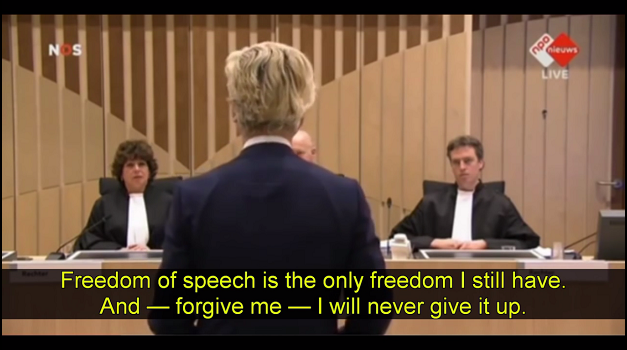
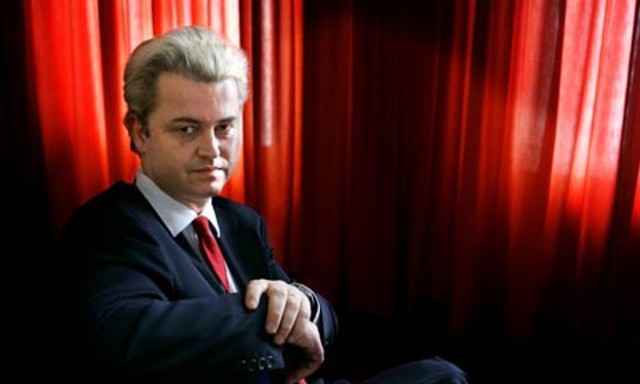
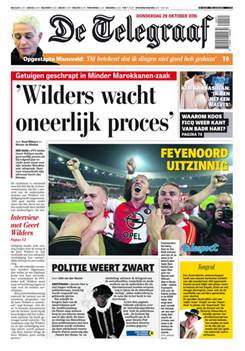 Wilders awaits unfair trial
Wilders awaits unfair trial